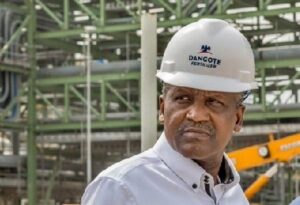Marketers Alarmed Over Dangote Petrol Price Delay as Fuel Costs Increase
Marketers Alarmed Over Dangote Petrol Price Delay as Fuel Costs Increase

Aliko Dangote
Oil marketers are expressing concern about the delay in setting the price for petrol produced by the Dangote Petroleum Refinery. This comes as the landing cost for imported petrol has risen to approximately ₦1,120 per litre.
Marketers are worried that if Dangote sets a high price for its petrol, it could lead to increased imports, as the government has opened the market for competition. The Major Oil Marketers Association of Nigeria had reported in July that the landing cost was ₦1,117 per litre. While petrol prices ranged from ₦600 to ₦700 per litre in July, the Nigerian National Petroleum Company Limited recently raised prices to between ₦855 and ₦897 per litre, with some independent dealers charging over ₦1,000 per litre.
The delay in announcing Dangote’s petrol price is leading marketers to intensify talks with their foreign partners about potential imports. Abubakar Maigandi, National President of the Independent Petroleum Marketers Association of Nigeria (IPMAN), noted that if Dangote’s price is high, marketers will consider importing petrol.
Maigandi explained that IPMAN is waiting for price data from its international partners to compare with Dangote’s pricing. He emphasized that competition in the market would help ensure availability and drive down prices.
A Dangote Group official, who chose to remain unnamed, stated that Alhaji Aliko Dangote is committed to reducing petrol prices for Nigerians, regardless of whether the Nigerian National Petroleum Company Limited (NNPC) becomes a buyer. The official cited previous successes in reducing diesel prices and expressed confidence in achieving similar results with petrol.
Despite ongoing discussions, the NNPC and Dangote refinery have not yet reached an agreement on pricing and distribution. The NNPC has stated it will not purchase Dangote petrol unless it is cheaper than international market prices. The NNPC also affirmed that it has no plans to be the exclusive distributor for Dangote’s petrol and emphasized that domestic refineries can sell directly to marketers.
The NNPC’s stance suggests a continued reliance on fuel imports, with government refineries still not operational. Dangote had initially anticipated a quick rollout of petrol from his refinery, but delays in negotiations with the NNPC could mean sustained high import costs until domestic refining capabilities are fully functional.
TRENDING SONGS
 NPMA Appeals to Nigerian Government for Compensation After Lagos Market Fire
NPMA Appeals to Nigerian Government for Compensation After Lagos Market Fire
 Rest Every Four Hours, FRSC Issues Safety Guide for Fasting Motorists
Rest Every Four Hours, FRSC Issues Safety Guide for Fasting Motorists
 NNPC Boss Ojulari Bags UK Energy Institute Fellowship
NNPC Boss Ojulari Bags UK Energy Institute Fellowship
 Shock in Anambra: Bride Disappears Moments Before Wedding
Shock in Anambra: Bride Disappears Moments Before Wedding
 Nigerian Woman Returns ₦330 Million Accidentally Credited to Her Account
Nigerian Woman Returns ₦330 Million Accidentally Credited to Her Account
 APC Don Reach Morocco?’ VeryDarkMan Reacts to Seyi Tinubu Poster
APC Don Reach Morocco?’ VeryDarkMan Reacts to Seyi Tinubu Poster
 Bride Breaks Down in Tears as Wedding Meals Were Kept Secretly While Guests Go Home Hungry
Bride Breaks Down in Tears as Wedding Meals Were Kept Secretly While Guests Go Home Hungry
 Odogwu by Day, Robber by Night: How Marriage Joy Turned Into Tragedy
Odogwu by Day, Robber by Night: How Marriage Joy Turned Into Tragedy
 Nigerian Officials Allegedly Pocket N4–6B Weekly Through Smuggling Cartels at Seme–Badagry Border
Nigerian Officials Allegedly Pocket N4–6B Weekly Through Smuggling Cartels at Seme–Badagry Border
 Ahmad Yerima: Naval Officer to Face No Sanctions After Clash with Wike – Matawalle
Ahmad Yerima: Naval Officer to Face No Sanctions After Clash with Wike – Matawalle
Share this post with your friends on ![]()













